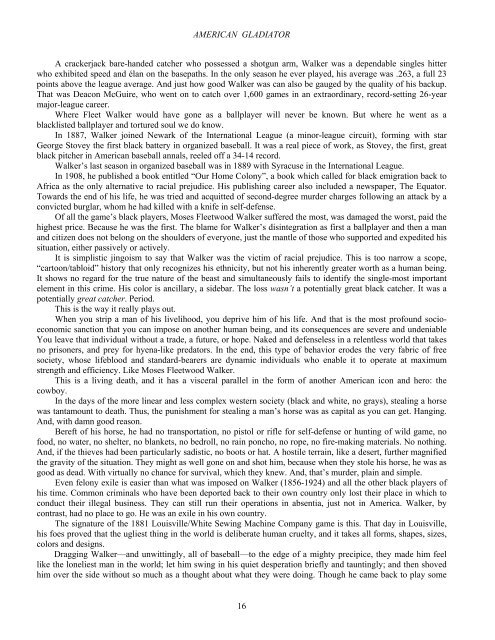AMERICAN GLADIATOR: The Life And Times Of ... - The Book Locker
AMERICAN GLADIATOR: The Life And Times Of ... - The Book Locker
AMERICAN GLADIATOR: The Life And Times Of ... - The Book Locker
You also want an ePaper? Increase the reach of your titles
YUMPU automatically turns print PDFs into web optimized ePapers that Google loves.
<strong>AMERICAN</strong> <strong>GLADIATOR</strong><br />
A crackerjack bare-handed catcher who possessed a shotgun arm, Walker was a dependable singles hitter<br />
who exhibited speed and élan on the basepaths. In the only season he ever played, his average was .263, a full 23<br />
points above the league average. <strong>And</strong> just how good Walker was can also be gauged by the quality of his backup.<br />
That was Deacon McGuire, who went on to catch over 1,600 games in an extraordinary, record-setting 26-year<br />
major-league career.<br />
Where Fleet Walker would have gone as a ballplayer will never be known. But where he went as a<br />
blacklisted ballplayer and tortured soul we do know.<br />
In 1887, Walker joined Newark of the International League (a minor-league circuit), forming with star<br />
George Stovey the first black battery in organized baseball. It was a real piece of work, as Stovey, the first, great<br />
black pitcher in American baseball annals, reeled off a 34-14 record.<br />
Walker’s last season in organized baseball was in 1889 with Syracuse in the International League.<br />
In 1908, he published a book entitled “Our Home Colony”, a book which called for black emigration back to<br />
Africa as the only alternative to racial prejudice. His publishing career also included a newspaper, <strong>The</strong> Equator.<br />
Towards the end of his life, he was tried and acquitted of second-degree murder charges following an attack by a<br />
convicted burglar, whom he had killed with a knife in self-defense.<br />
<strong>Of</strong> all the game’s black players, Moses Fleetwood Walker suffered the most, was damaged the worst, paid the<br />
highest price. Because he was the first. <strong>The</strong> blame for Walker’s disintegration as first a ballplayer and then a man<br />
and citizen does not belong on the shoulders of everyone, just the mantle of those who supported and expedited his<br />
situation, either passively or actively.<br />
It is simplistic jingoism to say that Walker was the victim of racial prejudice. This is too narrow a scope,<br />
“cartoon/tabloid” history that only recognizes his ethnicity, but not his inherently greater worth as a human being.<br />
It shows no regard for the true nature of the beast and simultaneously fails to identify the single-most important<br />
element in this crime. His color is ancillary, a sidebar. <strong>The</strong> loss wasn’t a potentially great black catcher. It was a<br />
potentially great catcher. Period.<br />
This is the way it really plays out.<br />
When you strip a man of his livelihood, you deprive him of his life. <strong>And</strong> that is the most profound socioeconomic<br />
sanction that you can impose on another human being, and its consequences are severe and undeniable<br />
You leave that individual without a trade, a future, or hope. Naked and defenseless in a relentless world that takes<br />
no prisoners, and prey for hyena-like predators. In the end, this type of behavior erodes the very fabric of free<br />
society, whose lifeblood and standard-bearers are dynamic individuals who enable it to operate at maximum<br />
strength and efficiency. Like Moses Fleetwood Walker.<br />
This is a living death, and it has a visceral parallel in the form of another American icon and hero: the<br />
cowboy.<br />
In the days of the more linear and less complex western society (black and white, no grays), stealing a horse<br />
was tantamount to death. Thus, the punishment for stealing a man’s horse was as capital as you can get. Hanging.<br />
<strong>And</strong>, with damn good reason.<br />
Bereft of his horse, he had no transportation, no pistol or rifle for self-defense or hunting of wild game, no<br />
food, no water, no shelter, no blankets, no bedroll, no rain poncho, no rope, no fire-making materials. No nothing.<br />
<strong>And</strong>, if the thieves had been particularly sadistic, no boots or hat. A hostile terrain, like a desert, further magnified<br />
the gravity of the situation. <strong>The</strong>y might as well gone on and shot him, because when they stole his horse, he was as<br />
good as dead. With virtually no chance for survival, which they knew. <strong>And</strong>, that’s murder, plain and simple.<br />
Even felony exile is easier than what was imposed on Walker (1856-1924) and all the other black players of<br />
his time. Common criminals who have been deported back to their own country only lost their place in which to<br />
conduct their illegal business. <strong>The</strong>y can still run their operations in absentia, just not in America. Walker, by<br />
contrast, had no place to go. He was an exile in his own country.<br />
<strong>The</strong> signature of the 1881 Louisville/White Sewing Machine Company game is this. That day in Louisville,<br />
his foes proved that the ugliest thing in the world is deliberate human cruelty, and it takes all forms, shapes, sizes,<br />
colors and designs.<br />
Dragging Walker—and unwittingly, all of baseball—to the edge of a mighty precipice, they made him feel<br />
like the loneliest man in the world; let him swing in his quiet desperation briefly and tauntingly; and then shoved<br />
him over the side without so much as a thought about what they were doing. Though he came back to play some<br />
16
















